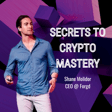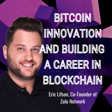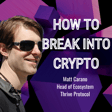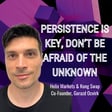Become a Creator today!Start creating today - Share your story with the world!
Start for free
00:00:00
00:00:01

Web3 Recruitment Alpha: Hiring and Landing a Job, with Dom Rohde, Head of Talent at Hero.io
Listen to Web3 recruitment alpha with Dom, a seasoned talent expert who's traded traditional headhunting gigs for the fast-paced chaos of blockchain startups. From identifying the key differences between Web2 and Web3 hiring hurdles to insider tips on snagging top engineers, building a standout personal brand, and what founders truly crave in their dream teams, this chat unpacks real-world strategies for job seekers and project leaders alike. Whether you're eyeing your first crypto role or scaling a team, Dom's no-nonsense advice from years in the trenches will leave you rethinking how to hire and how to land a job.
Transcript
Reunion in Dubai
00:00:00
Speaker
Dom, welcome to the show. How are you? Nice to see you, Jack. I think we saw each other last time in in Dubai. Yes, yeah, your guys' event, right?
00:00:11
Speaker
Yes, it was our Hero I.O. event with the the dancers on the patio. So nice to see you again. Yeah, you too. You too. um
Dom's Career Journey
00:00:21
Speaker
Dom, for people who don't know who you are, could you give us a bit of an introduction, please?
00:00:27
Speaker
Yeah, absolutely. so It would be easy for me to just say I'm, I'm a recruiter. Um, but, uh, the story really begins about nine years ago.
00:00:39
Speaker
um when, when I got thrust into this world of thinking about people and, um, and that's where it all really started and and the threads continue today, um but in different ways. So really where I've gone and been in the last almost 10 years,
00:00:59
Speaker
And where I've arrived now is, is that, uh, it sounds a little bit cheesy, but everything is about people and, um, whether it's, whether it's raising capital, whether it's starting a business, hiring people, uh, looking to build your next brand crypto project, blockchain, whatever it is, you'll inevitably have to.
00:01:20
Speaker
work with people and not just work with people, but work through people. And so I guess I've spent the last, um, 10 years or so trying to figure out how, how to do that properly and then how to, uh, advise and guide people on how to work with people and through people. So I guess that's how I would summarize it, uh, overall right now.
00:01:43
Speaker
Sounds cool, man. And obviously now you're pretty heavily involved in all things blockchain, ai Could you talk us through your career a little bit and maybe how you ended up here in this industry?
00:01:57
Speaker
Well,
Singapore and the ICO Boom
00:01:58
Speaker
I remember living and working in Singapore, 2016, 17, 18. And, um, there I was in a, uh, in a search firm, you'd know all about the classical research, Jack.
00:02:09
Speaker
Um, so ah doing, doing that, you know, invoice three in three parts, uh, when you start the mandate, when you show the present, the, um, short list, uh, or long list. And then when you place the candidate, ah was doing that for, um,
00:02:24
Speaker
for European companies setting up the APAC offices. And, um, that was in packaging technology. We worked with even a mobile forensics company, working with customs law enforcement agencies to track your phone. If you're a criminal or, you know, uh, somebody who was deceased and they needed to pull the data.
00:02:42
Speaker
So that was, that was all very fun. And that was my first two years in in talent management. And I remember sitting in Singapore and, um, And, uh, there was a lot of discussion around crypto and this was, this was after or during the ICO boom of 2017. And, um, i remember thinking what on earth is this ICO business?
00:03:05
Speaker
Um, at the time i you know, i was 26 and going out every weekend and my priorities were very different. Um, and I
COVID-19 and the Shift to DeFi
00:03:14
Speaker
just didn't look into it and, um, fast forward a little bit, I ended up in, uh,
00:03:21
Speaker
in Lithuania during COVID and as fate would have it, had, I was, I was doing some on and off recruiting for some startups just to keep the money coming in, living off 800 to a thousand euros a month in ah former Soviet country, uh, during COVID, you know, living the dream and they would have it, I recruited, recruited friends said, Hey, um, you still doing recruitment? Because I've got,
00:03:49
Speaker
this Australian guy, i know you're Australian. I've got this Australian guy from Byron Bay, um, looking to build a DeFi protocol. And I thought, okay, firstly, what's a protocol, what's DeFi.
00:04:02
Speaker
And, um, he made the introduction and I started, ah took two weeks, went down the rabbit hole with a Coin Bureau, went down the rabbit hole with all these YouTube videos and, um, and, and medium articles and, and, and Twitter.
00:04:17
Speaker
um And within two weeks needed to basically find like two or three engineers and and a VP, um made it happen. And then I thought, wow, okay, this is very interesting. I learned about Aave and compound and all that. And since then, i um i just went further into it, um sometimes against my my better ah my my better judgment, but it's been fun.
00:04:43
Speaker
yeah it can be a Yeah, it can be a bit like the Wild West sometimes from a recruiting perspective in Web3, but it definitely hooks you. Once you get interested in it, it's difficult to look outside, think, just because the way the industry works and that kind of thing, right? You get used to operating in a certain way.
00:05:04
Speaker
The interest is really important. If you don't have an interest, ah whether it's learning about crypto, blockchain tech or learning a new language, you have to have the interest, otherwise you won't get very far.
00:05:16
Speaker
Yeah, agree. I agree. So moving then from, we'll say traditional recruitment, but like traditional recruitment being web two into web three, have you have you noticed, like what what differences are there? Have you
Recruitment Strategies: Web2 vs Web3
00:05:31
Speaker
noticed much a difference in the way that you search and the challenges you come up against? Like, could you talk us through that a little bit Oh, absolutely. um I've spent plenty of time thinking about this and I think I'm an unusual recruiter because I have invested in in five startups and I'm now a co-founder in in a sixth, which is actually frozen pizza business.
00:05:55
Speaker
Yes, thank you very much. um In Minsk, Belarus, out of all places. And we started we sold our first pizza on the 3rd of April and we've now sold 45,000.
00:06:06
Speaker
forty five thousand So, uh, and we're profitable. Uh, so, um, and that's with three other guys, three other co-founders. um and I sit on some advisory boards, uh, still small companies, right.
00:06:18
Speaker
But I see i've seen the operations and the the considerations from a higher level and in a more holistic way. So when i come when it comes to recruitment, I can see that different some sometimes other questions need to be asked that other recruiters won't necessarily understand or be exposed to because they haven't either been a co-founder or haven't invested in businesses. They they've done recruiting for a very long time, which is nothing wrong with that.
00:06:50
Speaker
It's just that, um, when you get to the question of, should we recruit a bunch of other questions should have been, discussed and answered, answered previously.
00:07:02
Speaker
Um, so now I've a little bit lost, uh, the, your question. Can you just remind me again? The differences between Web 2 and Web 3 recruitment or different challenges you come up against, that kind of thing.
Challenges in Web3 Recruitment
00:07:14
Speaker
Yes. So this is the first big difference, which is in in the Web 2 world.
00:07:18
Speaker
ah these These business questions are asked first. um And that has ah an an impact on the what I call like the talent cycle. And um there are three other questions that you should ask before you go out and hire someone, which the first one is,
00:07:34
Speaker
And it's about capabilities. You really want to understand what's your current capabilities to meet your business strategy. Because if your people strategy and your business strategy are not aligned, you will find a lot of problems.
00:07:47
Speaker
um So the first question you ask when you're looking at your people strategy is, um who do we already have? and And I think I've seen you actually post about this on LinkedIn ah once or twice.
00:07:58
Speaker
Maybe you don't need to hire. Maybe there's someone in in, in the team, uh, operational team, executive team, whichever team, or even extended teams that you couldn't can can real reallocate.
00:08:12
Speaker
Um, and you have those discussions and you do that or, and then the second question that you you should be asking is, uh, who can we develop and train in this world? There's no excuse, uh, not to, not to retrain, not to relearn, not to do the courses.
00:08:27
Speaker
There's a lot of AI tools out there. There's Coursera, there's paid courses, there's free courses. And then there's people inside your organization that can train them. And you just make a plan and say, okay, for the next two months, who's going to knuckle down, um Jack is going to train Matthew and Matthew becomes who he needs to be to fill this capability gap. And you don't need to hire anyone.
00:08:48
Speaker
Um, and then, and then really the, that final question is, okay, uh, Those first two you, for whatever reason, you're not going down that path and you need to acquire a capability.
00:09:03
Speaker
Maybe you're you're wanting to pivot a business unit. Maybe you want to. ah bring in a new technology. Maybe you're wanting to go into a different market, in which case those first two options are not going to help.
00:09:16
Speaker
So then you go to that final option, which is okay, let's, let's hire someone. Um, so I think the the first and the the biggest difference is that web two companies go through that thought process.
00:09:27
Speaker
And it also is related to, because they're more mature web two companies are more mature. They're making money. They're usually profitable. So they that they're going through that thought process web. Three companies, crypto, blockchain, are it's still not at that level.
00:09:42
Speaker
The narrative is starting to change. And I think the the goals of venture capital and founders is changing now towards a sustainability direction, which is excellent.
00:09:53
Speaker
And recruiters such as you and I will feel the positive impact of that um because when it comes to hiring, we'll feel the company is more serious. They've asked those business questions first.
00:10:06
Speaker
um So that was that's like the the the meta macro difference. and
Improving Web3 Employee Retention
00:10:11
Speaker
and then ah And then to bring it down, to the ground a little bit more, I would say there is also ah more of a selection process that happens in the web to world or less of the selection process that happens in the web three world. Um,
00:10:26
Speaker
it that It's shorter, it's compressed. The whole recruitment process is is compressed. um If they like, if the hiring manager likes someone, if they've come from the right background, um if the salary fits, okay, let's just get them in, let's hire them.
00:10:41
Speaker
um ah There's plenty of times when i've when I've seen that hasn't been a selection process, a proper one where they Say, okay, here are the four resumes. Let's talk internally with our stakeholders and compare them strengths, weaknesses, areas for development.
00:10:56
Speaker
um that that ah That's what I was used to eight, nine, 10 years ago, and in the kind in the current space, very, very rarely. um Even I was involved in such discussions as an external party.
00:11:10
Speaker
um you know You'd be dreaming in the Web3 world for an external recruiter to be involved in a selection process. So, um that's the second difference. Um, and, uh, and then I would just also add bits and pieces like, uh, it's a little bit nepotistic.
00:11:30
Speaker
Um, uh, if you happen to know the right founder or the investor or somebody else happens to know the right founder and the investor, they, they're going to be ahead of you. um but But I'm seeing some positive developments. I'm seeing a little bit more, let's say, professional approach in in the Web3 space, especially this year.
00:11:50
Speaker
um and And that's always great for candidates and for recruiters. It's great for everybody, actually. Yeah, you're right. Do you think that if projects started implementing a real solid selection process, there would be a lower turnover?
00:12:07
Speaker
In Web3? Because as a it's what it's an industry where people stay, i wouldn't know what the average is, but I can't imagine the average being more than eight, nine months, realistically, but for a lot of people in the industry, right? do you think yes Do you think that would improve if there was a no its true thanks for much more ah longer selection process?
00:12:28
Speaker
No, it's an excellent question because... um The preconditions for for selection process is um if you're if a company is running selection process, it means that they they have a level of confidence in this in this role, in this position, in the future of this role.
00:12:49
Speaker
They're investing into the process. And if they're investing into the process, it means they're expecting that it's going to be Minimum 12 months. um ah Less than 12 months doesn't make sense for a company because it's very costly to hire people or to hire the wrong people and have to fire them.
00:13:06
Speaker
And also takes time for individuals to really get into the role, to gel with the team and to build whatever capability the company's wanting them to build. that This takes time. So the company's definitely thinking 12 months ahead.
00:13:21
Speaker
And what does that mean? Well, it means They have to be solid financially. It means they have to be solid with the customer base or users or community or developers, whatever it is.
00:13:32
Speaker
And if they're confident about all of those things, it means they've got a pretty solid business. And then how many pretty solid businesses do we know in this industry? Well, there's your top,
00:13:43
Speaker
Top ones, your Cardano, your parities, your, um, you know to top, top 50 coin market cap, uh, and then development companies that are making a consensus, et cetera, that are just making a ton of money.
00:13:57
Speaker
Um, and then outside of that, in the startup world in particular, how many businesses do we know that are looking at 12 months ahead and saying, okay, we are confident for the next one year.
00:14:08
Speaker
There's really not many. so So that that's the precondition. And then those that are confident in the 12 months and are doing sexual process, no doubt that the retention would increase.
00:14:21
Speaker
Um, because when you're looking at a selection process, you're, you're looking at someone's personality, how they, how the, the, the working culture, um, how they see things you're looking at their, um, intelligence level. Are they basically a smart person?
00:14:37
Speaker
Are they able to learn fast? us Um, you're looking at, uh, at the track record. Um, you're looking at references. And then you're identifying areas for development and and hopefully coming up for, uh, with a plan to help them in those areas to for development. So that's, that's a full exercise. Um, and, and it will make the person that's joining a company extremely confident, uh, in, in them taking this leap and, um, and that they're able to bring up issues that come up.
00:15:13
Speaker
Once they've joined with the management without fear of, um, uh, repercussions or, or, or any sort of biases. So yeah, absolutely. i think retention would increase dramatically.
00:15:29
Speaker
I think in the long run, it also, if you do implement those kinds of selection processes, I think in the long run, it, it really helps you hire because Right now projects look at things and they go right, we need to get someone in super, super quick. The candidate experience through a lot of these interview processes is fairly rubbish. They get a reputation for really not running those things very well.
00:15:50
Speaker
The candidates who don't make it, who do have a really bad time through that process, they then tell all of their mates, bad news, travel is quick and the good news. And then in a year's time when they've raised they need to scale, you've got five, 10 times more people who than were in the process going, actually, I don't think I want to interview there because my friend had a really bad experience.
00:16:10
Speaker
um I think it helps with the candidate experience side of things massively if you have some form of formal selection process there really. Completely. Quality is the most important part. If you've just if you're if you're selecting two excellent candidates, that's far better than five or six ah mixed bag, definitely. like Yeah, for sure.
00:16:36
Speaker
so but So in terms of the actual roles that you see there and the roles that you've recruit you do you see ah roles in particular areas now that are in like the highest demand?
00:16:47
Speaker
Could you talk
Demand for Engineering Roles
00:16:48
Speaker
us through that a little bit um and what you've seen so far, at least maybe over the last six months? Yes. About six months ago, I took the decision to um focus on engineering.
00:17:01
Speaker
i I realized in the previous bear market that having been in in ah another agency, that, uh, the, the only recruiter still making money in in that agency was the guy that was working on engineers and I was stuck with products.
00:17:18
Speaker
I was stuck with products and my buddies were stuck with ah marketing and, um, commercial roles. And product was kind of like, it was just an afterthought for every company, um, ah at that time.
00:17:33
Speaker
And, but engineering, I saw that, uh, companies were still wanting to see great engineers. So I thought, okay, this time around I'm doing the, what he did. Um, so I will limit my comments a little bit to that, but, but I still have a pretty good oversight of all functions. So right now, um,
00:17:55
Speaker
Well, I would say in the last two months, um, engineering has definitely picked up nicely. it was okay before that, but it's picked up. And when I say engineering, I'm talking about, protocol level roles. I'm talking about, um, backend and full stack front end has been strange. Uh, I I'm not sure because it's, uh, because of AI tooling really helping to take over, uh, coding.
00:18:22
Speaker
There um it's and it was very difficult to find a good front end engineer. And now there's just a lack of demand for, it for whatever reason. And then, and then I would say engineering managers for larger companies, I'm sure still exist.
00:18:37
Speaker
Um, but for smaller companies, it's not really a thing right now. And then you, and then you kind of goes up to same, same with staff engineering. And then it goes up to VP from your seniors and leads. It kind of jumps up to your VPs and CTOs.
00:18:51
Speaker
Um, not much in the middle, but I'm sure the larger companies are still have that depth. So yeah, it's pretty consistent across the board right now um with the sprinkle of of AI ah engineers or automation or Python engineers that can develop internal tooling or developer support tooling.
00:19:15
Speaker
um And then on the commercial side, I'd say that good marketers are always needed. Uh, but it just depends on what the client's willing to pay depending on the time of the year or the market cycle.
00:19:29
Speaker
Uh, so, yeah and marketers should be very, very in tune with, with that. I've seen, I'm still seeing 250, $350,000, um, requests, salary requests, uh, which is pretty, pretty insane considering the retail market isn't there.
00:19:50
Speaker
And it will make a little bit of a comeback, but I don't, I don't see it being nearly as large as the last, uh, the last, um, bull market. So yeah. Yeah, that's fair.
Programming Languages in Blockchain
00:20:05
Speaker
And if you, uh, if you're an engineer, do you think say you're looking to, uh, move into the blockchain space, do you think it's worth heading down the rust Solano route? Would you go solidity EVM stuff? Would you stay fairly agnostic?
00:20:23
Speaker
Any thoughts on that based on what you've seen? I think engineers decision-making should rest on two things. One, which ecosystems do they like and prefer? if they don't have a view on that then which web 2 technologies are they really good with is it ah because if they're c plus plus engineer it's much better to go the rust route um if you're python or pretty much anything else you can learn solidity quite you can go to some advanced boot camps um knock it over pretty fast and then it's just a matter of getting the work experience
00:20:59
Speaker
In my view, um, in my view, I'm seeing, I'm seeing, C plus us rust. And now there's a new one. Uh, is it called flicks nix?
00:21:10
Speaker
Um, uh, and girling, of course, uh, being used for much higher performance systems. So in your high frequency trading, your DEX is your, um, layer one protocols.
00:21:25
Speaker
And so ah definitely see that. uh, as a, as a strong pairing, and then your DAPs or, um, consumer facing products, uh, using, using Solidity and perhaps some other smart contract languages as well.
00:21:44
Speaker
So I will also see that, um, what it diverges as well. So if you're going infrastructure, go for this high performance and quite secure programming languages. If you're going for consumer market dApps, you want to, you're you're interested by that ah side of the market, then probably Solidity and other languages.
00:22:09
Speaker
Yeah. Nice. Thanks for talking that through. I think, I think, um Based on what you've you've said there, I mean, there's roles across all areas, I guess, right? like Based on what you've you've said there, if you're looking down the rest route, down the solidity route, um as you said, I suppose it just depends on what you prefer and what you want to code in.
00:22:28
Speaker
If you see roles across all those different areas, I mean, there's probably no right or wrong way to go about it by the sound of it. Just do what you enjoy. Yeah.
00:22:38
Speaker
yeah
00:22:42
Speaker
so um So if, say founders are then looking at, well, how do we how do we hire engineers? Where do we go? um there any common mistakes maybe that you see those founders make when it actually comes to hiring these
Recruitment Shortcomings in Startups
00:22:59
Speaker
people? Like, are there anything that those founders can avoid if they're trying to hire good engineers?
00:23:05
Speaker
ah Engineers are relatively straight, more straightforward. That's another reason for my decision, this, this market cycle to just stick with engineers because i was kind of sick of this, all these subjective decisions and founders changing their mind or the co-founder having a different decision, opinion to the other co-founder and the investor having a different opinion to that second co-founder.
00:23:29
Speaker
So I thought, you know what, that's just like a good engineer is a good engineer. And there's very, people can't disagree on it It's good code is good code. So, um, that's what I'd say on, on that. It's, it's way more straightforward when it comes to product.
00:23:46
Speaker
It's also a medium level, straightforward, but when you go anything, commercial marketing, sales, um, business development, um, That's when things, when founders really need to have it process in place for making decisions or reaching a consensus among themselves.
00:24:04
Speaker
Um, and I find that the biggest issue with that is they don't, they, they don't have consensus process. Uh, they're not sure why they make decisions over people using a lot of gut feel, which is normal. It's human, but it needs to be backed up by and and by whether it's an interview process, whether it's taking references, whether it's, uh, putting them through, an aptitude test.
00:24:30
Speaker
Um, I know a company that started and implementing aptitude tests, uh, to at least make sure that their staff are ah good problem solvers. Um, so and that's a normal mistake. Just rely purely relying on the gut feel rather than matching that or verifying that with, um, with data.
00:24:49
Speaker
Um, And then ah another common issue is that they will hire the first person that comes through the network that is referred to them by the investor. And, and there's just a lot of bias there involved with that. And, uh, someone's previous success does not necessarily equal the future success. So, um because the behaviors required in a previous company are different to the behaviors required in your company. So, um, if you're going to,
00:25:18
Speaker
speak with referrals, make sure you go through a proper assessment process with that, put those individuals at least, um, the better option would be to interview two or three others, ah fresh or new candidates and then go through the so selection process.
00:25:36
Speaker
Um, and then there's other common mistakes like, um, not having a well thought out job description. Um, not put if you're a founder, not placing yourself in the foot of, uh, shoes of a candidate and asking counterfactual questions and really putting the job description, job specs to the test.
00:25:56
Speaker
Um, and then having a, um, strong recruitment marketing pitch. Uh, so why should candidates join you? And, and what's, what's, um, what's the future going to look like?
00:26:10
Speaker
What are they fighting for basically, or what will we be fighting for together? Not really explaining that or explaining that at all. Um, I get a lot of clients that just say we want X, Y, Z. There's no narrative around the company. There's no narrative around them.
00:26:26
Speaker
Uh, there's still some undoxed founders, which is kind of crazy. Um, so yeah, uh, those are the main points. Yeah, for
Attracting Talent with Narratives
00:26:37
Speaker
sure. And I was i was going to ask you, ah is there anything really important that founders should have in place before they start to scale their teams? But I think you've touched on a quite a few those points. So real solid ah selection process sounds super, super key.
00:26:53
Speaker
Yes. And then prior it to that, in the you know when theyre when you're building your talent pipeline, I would also have listed and shared with your colleagues, including HR manager or recruiter or whoever it is,
00:27:05
Speaker
Um, like a must haves and, and ah few points on willing to compromise and then everything else is just not, doesn't fit in and, and please don't show me candidates or let's not talk to candidates that are not, don't have the must haves at least.
00:27:22
Speaker
Um, and that will just make the process lot smoother. Yeah. Yeah. You're right. Um, how do you actually attract? those, top those people, like, how do you track the top talent to a project?
00:27:37
Speaker
Uh, if it's a young project, unfortunately, well, I'm not sure if it's unfortunately, unfortunately, i think the direct approaches is the, is the, your first point of call approach those people that you want to join your company and make sure you have a really compelling story about it.
00:27:57
Speaker
And, um, uh, whether it's problem you're solving that no one thought about or in a way that is extremely exciting and viable and scalable.
00:28:09
Speaker
So come up with some really, really exciting narrative. think that's the first point, whether you're doing a direct search, whether you're doing a job ad, whatever it is, you need to have a really compelling narrative um because a lot of talented people will join your company if Uh, talented and expensive will join your company. If you have a really compelling narrative and it's exciting and they'll tell their network about it and they will accept a low compensation.
00:28:38
Speaker
So, uh, in a, in a, and they will do that voluntarily. Uh, if you have a really strong narrative and you're a strong leader and you're able to show a comprehensive plan.
00:28:50
Speaker
Um, so. So that's what young companies especially should be doing to attract talent because they don't really have the time to go on a massive recruitment marketing campaign to create, create even a careers part in their websites. Maybe it's just a notion page or a telegram blurb.
00:29:10
Speaker
Um, and they don't have the time to make LinkedIn, job, job posts and do X, Y, and Z that larger companies have the ability and luxury to do.
00:29:21
Speaker
So that would that's the main thing to attract to attract the talent. oh Yeah, i think I think that I've seen that pay off dividends hugely. Definitely. well Simon, you know Simon Sinek?
00:29:35
Speaker
Have you heard of him? Don't know him personally. Not personally, but might have seen his videos or books and stuff. he he speaks about ah He speaks about that you should try and work with people who believe what you believe.
00:29:50
Speaker
So I feel like if you create story, you create that vision, you really create that why someone should want to join you. Like that's what people start to really believe in and really want to get behind. I think that can... as you said has a huge impact in people moving jobs or maybe even taking um moving away from really stable uh roles to take something super risky because let's be fair joining a small crypto startup is probably one of the riskiest moves you can take really so having that narrative having that why is super super powerful for for doing that um
00:30:23
Speaker
It also as well, it helps you with the selection process. I know he's talked about selection process a bit, but if you have that, ah why? And if you don't get the feel that people actually believe in that and they don't have similar sorts of values and that kind of thing, then that's super easy way to select people or you know remove people from the process. who You don't tick those boxes, right?
00:30:45
Speaker
Yes. Whether founders like it or not. Uh, whether more, whether they're more interest introverted or extroverted, that's just, um, that's an approach I'll need to take. And they'll need to actively be curious about candidate or the the people's, um, their own ambitions and their own interests and how can they marry those two together, what the startup is planning to do and what that individual person wants to achieve and what they're interested in. And if they can and get that match, it's like miracles can happen.
00:31:20
Speaker
For sure. but um Well, done you've shared a ton of advice on ah what projects need needs to have in place, what founders can do to hire talent effectively.
Building a Personal Brand in Crypto
00:31:30
Speaker
What about if someone is looking for a job in crypto right now?
00:31:35
Speaker
What skills do they need? Do they need to do certifications? and there Are there any types of projects candidates should do for themselves to make themselves really stand out? Can you talk us through a little bit? like How does someone actually get a job?
00:31:49
Speaker
Yes. Um, controversial topic. Uh, there's a lot of advice out there. I'm just trying to think of really where you can get the, the alpha.
00:32:00
Speaker
Um, and if I'm, if we're assuming they don't have one three experience, right? Uh, yeah, let's do that. Yeah. If they don't have web through experience. Yeah. In that case, the the best thing you can do is make yourself visible, whether it's, um,
00:32:18
Speaker
And that could be building a brand on LinkedIn and just posting every day, every second day. Um, and just getting eyeballs to your profile. Um, or, and that could also be, I don't know if you, if I don't know if Instagram is a thing in in this space, probably not, but X okay. X, um, get, get people seeing your profile and X put out your pin, your opinions out there.
00:32:43
Speaker
Um, share research, do research. pretty much whatever you need to do to get eyeballs. um And then people will start looking at you. And that because if you don't have people looking at you, you're not going to get opportunities.
00:32:56
Speaker
So that's the number one thing you're going to do. Or you can send 50 LinkedIn messages a day, whichever one, whichever one you feel like you can have the patience for and, and bandwidth.
00:33:09
Speaker
But the the point is you need to have people looking at you. And if you're not, because when they're looking at you, People get ideas to see, okay, well, all right, Jack comes from a sales background in automotive.
00:33:23
Speaker
Um, oh, and, and 99,000 people will look over you, but it'll take one person to say, oh, we actually need a sales manager for a custodial, uh, crypto custodian for a crypto custodian startup or a company or whatever.
00:33:37
Speaker
And it's hard to find salespeople. If you can sell cars, why can't he sell a custody solution if we train him up? So, um, but So you need people to to look at you. That's number the number one. I'm not suggesting to do shitposting or spamming or share misleading information. It needs to be informative, but that's the number one thing you can do, um especially if you're not an engineer. If you're everything else, that's the number one thing you can do.
Networking in Web3
00:34:06
Speaker
If you're an engineer, honestly speaking, i would I would hit up engineering managers, CTOs, and VP of engineering directly on LinkedIn. Um, and just in say, look, you've got this web to experience and here's my code contributions, portfolio, whatever.
00:34:23
Speaker
And, um, and it aligns with, and if you train me up, I can learn your technologies, because i do see a need for junior juniors and interns to join companies in the engineering team.
00:34:41
Speaker
In the marketing team, I, I feel like it's just, um, it's not something, uh, it's not something that they want to spend a lot of time on, but, but engineers understand that it's constantly evolving and, uh, they're very willing to kind of like train each other.
00:34:58
Speaker
So that's what I would suggest. Um, yeah, to kind of like take those two approaches. ask for referrals, um, speak with recruiters. Recruiters are a little bit stuck because, um they need to place people, but still, um, 95% of recruiters that I know are willing to help out, to give you, right and give you ideas, to put you in touch with people, put you in touch with with hiring managers to send you to the right places.
00:35:28
Speaker
Um, and then, and then you can always approach Other people in companies that you want to join that are not founders, that are not executives, not managers, not hiring managers, they're kind of broadly teaching broadly speaking team members and ask their advice on how they can join the company or how they could speak to the right person.
00:35:51
Speaker
I think a lot of employees are would love would love to give their advice. They'd love to speak with people from the outside world, so to speak. and bring in normies into the space.
00:36:03
Speaker
So that's also another piece of advice. Yeah, I think that's, I think that can be really powerful. Building your own, actually a few things you said that can be really powerful. um Building your own personal brand.
00:36:15
Speaker
Definitely, definitely, definitely. Like if people aren't doing that already, that's such an easy way to, as you said, like get more visibility on your profile. If you're really interested in, in web three, which to join the industry,
00:36:27
Speaker
You can't really be half fast about it. You're either really into it and you want to get into it or you're not really. And you're going to be up against to people who are so passionate about the space that they can name you.
00:36:39
Speaker
The 10 projects that launched this week and how the TGs went and what they're building and that kind of thing. yes Regardless of the position that you're in, you can write your thoughts on LinkedIn on X about what it is maybe, maybe super related to like your job or like how you would go about stuff or like analyzing stuff that's been released or talk about different projects that you like and why you like them and that kind of thing.
00:37:03
Speaker
Because I think then when people do come across to your page, when you are applying for stuff, say you send your CV somewhere, have your social links on there and things. When people come across, they go, well, you know, Dom doesn't have experience in Web3, but I can see he super passionate about it because all he's written about for the last three months is blockchain, crypto, Web3, new wallet, staking, like whatever it is.
00:37:25
Speaker
yes So I think that, yeah, it's super, super powerful for for doing that. um You can also find roles purely from that. I know a VP of engineering who works at a very... ah very prominent ah project who actually got his job from posting YouTube tutorial videos for people on how to code with certain things and how to like build smart contracts, all that kind of stuff. And the founders saw his YouTube page and said, we love what you say.
00:37:52
Speaker
yeah ah Come and join the business. Do you want to be our VP of engineering? I mean, I'm not sure how often that happened, but it can. Basically just set up your channel and pretend you're the dev rel or. Yeah, there you go.
00:38:09
Speaker
Yeah. Yeah. Easy, easy. and And then yeah, as you, something else you said there about networking with the teams. I always say to people, if you're looking to break into the space, build a list of 200, 250 projects that you really like to look up.
00:38:25
Speaker
Try and find the teams, just reach out them on X, join the communities, the ones you really like. Just try and add value, answer community questions if people are asking about it, if you know a bit about the protocols and things. um Try and do any bounties that you can get involved in if there are any.
00:38:39
Speaker
Join any hackathons that you can. They're always a good one as well. But like just try and grow your networks within the industry because you'll be surprised how many people will give you a chance if you know someone in the team already. As you said, like founders, they choose people that they already know or that have been recommended to them, right? So like if you can try and grow your network, that's probably one of the most powerful things I think people can and do.
00:39:02
Speaker
And to be a little bit realistic on the compensation, what potentially very realistic, um, maybe put in, um, a few months of of free work or low paid work. I think just need to be very realistic about that as well.
00:39:17
Speaker
Yeah, that's a good, yeah. It's actually being able to take a bit of a dip to get into the industry is yeah, it's, that's a good shout. Yeah. Um, so you must've interviewed thousands of candidates probably over the last, uh, few years working in the space, any particular mistakes that stand out for you that everyone makes that you said, I just wish people had stopped doing this and it would help them tenfold.
Keys to Candidate Success
00:39:44
Speaker
I'd like to switch it just a little bit more towards, um, what candidates can do to stand out in a positive way. and, and what, or rather what talented people tend to do, which is they tend to be very clear in what they're good at and what they're not good at and be able to in the first two or three minutes, rank all of those and disqualify themselves from things that they're not good at. And they would not be comfortable being proposed for. So they're very good at communicating that.
00:40:20
Speaker
And very good at communicating that verbally in written form or a video call, um, or any other form. So very, they're very good at, they know who they are and they're very good at communicating that that's what really stand up people do, um at all levels of senior seniority.
00:40:40
Speaker
Um, and, um, yeah, I think that's, that's really the the main pattern. Um, and and they're overall very good communicators. So as we're going through the recruitment process, let's say it's between rounds and, and it's probably taken a little bit longer from the client ah to give the feedback.
00:41:06
Speaker
Um, they'll be very good with the followups and to say, look, I know it's been a little bit of time. Have you managed to, uh, speak with the client yet? Um, Their patience level is is very high and actually as a good recruiter, one thing in the last, especially six months, I think I've really worked on is is my patience.
00:41:26
Speaker
need to be very, very patient in this in this space with with the feedback, either getting it or receiving it. I need to be very open to strange things happening um and and the good and the best and the best candidates are very, very patient, I would say.
00:41:47
Speaker
Yeah, that that's that's good advice for sure. ah yeah I agree. And then pushing technical skills aside, what types of people are founders really looking for? Obviously great communicators, as you just said.
00:42:01
Speaker
Anything else that founders really want to see from people?
Proactive Candidates in Founders' Eyes
00:42:08
Speaker
Well, if we're talking your CEO or founder, they...
00:42:14
Speaker
they really want people to take work off the table without those people really knowing what the work is. So I know that sounds like a a big ask, but what it means in practice is that me people, the people that want to join the company can, can preempt the CEO founders needs and realize that they're very likely focusing on number one on fundraising.
00:42:45
Speaker
And dealing with investors and number two, dealing with customers or users. And those are the first, and there's a first and maybe only two things that they should be focusing on.
00:43:00
Speaker
Whereas their sidekick or like the co-founder COO type, you know back office co-founder is focusing on everything else. So if, and in this space it's usually the CEO driving the hiring decision at that, at that point. so the best, uh, the most insightful people or candidates will realize those are the two interests of the CEO and come in and say, all right, I can handle all these other stuff for you.
00:43:27
Speaker
And i'm pretty sure this is what needs to happen. And, and get it done. Um, CEO is extremely busy. ah they are pulled, uh, pulled everywhere that you can think of. They're traveling. they're going to conferences. Let's not forget. They need to be very evangelical. They need to be up there on the stage. They need to be championing, championing their approach to cross chain lending or their app or whatever it is.
00:43:55
Speaker
And, and so if you can, as a candidate come and say, all right, I'm going to take all this off your, off your hands and I can start on Monday. Um, I think that's the type of people that they're looking for, including, including an engineering team whatever team, uh, that's what, that's what founders looking for deep down.
00:44:13
Speaker
And, and they're not really going to tell you that either because it may, otherwise it might make them sound a little bit demanding or um somehow not able to handle everything. This is the irony of founder CEOs.
00:44:28
Speaker
um They also won't tell you that they need the help because they're expected to look like Steve Jobs in the eyes of their investors, of the team, of their family, of everybody.
00:44:39
Speaker
So they're also not going to tell you that. Yeah, that's that's in summary. Dom dropping some industry trade secrets right there. yeah yeah but la So Dom, you've shared some great advice over the last 45 minutes.
00:44:58
Speaker
um To finish up, are there any closing words or like any piece of advice that we haven't talked about that you think is super important that you'd like people to take away from this?
00:45:10
Speaker
Absolutely.
Research and Passion in Job Seeking
00:45:11
Speaker
And I had a chance to think about this before we started the call. So could probably narrow it down to three things. The first thing is DYOR.
00:45:22
Speaker
um Always do your research in this space. It's it's absolutely key whether you're applying for jobs, download that app, connect your wallet, make sure it's a legit website.
00:45:35
Speaker
Um, and, and play with the the product, the technology, the bridge, the swap, the it virtual machine, whatever it is, um Make sure you're using tech where this is still technology. Use the tech, ah use the platforms, check the social media channels and really, really do do a deep dive. It's going to be very impressive to whoever you're to the hiring manager.
00:46:03
Speaker
And you'll also get some insights and be able to make you'll be able to impress them on the call. So that's number one. Do your own research and don't always rely on what other people say. um Number two, um um but sure I would say is like,
00:46:22
Speaker
Always inject your passion where wherever you can show that you care, show that you're interested, show that you would really like to see something in the space um and and then portray your passion over video calls, over LinkedIn, whatever social media and professional channels that you can.
00:46:43
Speaker
This is going to shine through. Um, but then also be prepared to, to back it up. Um, so if you're showing your passion and your interest and it's because it's, it's contagious, um, then be able to back it up with your facts and figures and knowledge and experience and your ideas. So.
00:47:02
Speaker
So those, those are the two main, um, uh, points of advice for candidates. and And then where I see the hiring hiring going in this industry, I do see it maturing and, and professionalizing it. I see companies.
00:47:20
Speaker
Um, finally seeing the, the, uh, uh, in their, in their behavior, which is so hopefully they will stick to reliable recruitment partners.
00:47:31
Speaker
I think they will start to have a lot more well thought out ah job descriptions and reasons for hiring. They'll have a lot more well thought out selection process and budgeting and also expectations on on KPIs, on the goals that these individuals should be meeting and the and the success criteria.
00:47:51
Speaker
So, I mean, the talent acquisition is just the beginning. Then the person needs to onboard and start. And like you pointed out earlier, they need to stay at the company.
00:48:03
Speaker
So then you're getting to the talent management side. And I think talent management will also play a larger role. And we're going to see more ah comp and benefit managers. We'll see more performance managers. We'll see more of,
00:48:18
Speaker
that that type of thinking going on, more strategic people strategies and building capability strategies on the on the company side. So I'm looking forward to that. And I also, i will add, ah going to see i think we'll see a lot more institutional adoption, companies coming up with products and services for companies using crypto and the public markets, public chains are going to be um somewhat absorbed or used Um, but still very, very important.
00:48:48
Speaker
And, um, and we're going, but we're going to see a pretty even split, I think between retail and institutional hiring in the next, uh, 12 to 24 months.
00:49:02
Speaker
Tom, thank you very much for joining me today. You shared some great advice and, uh, maybe let's jump on in 12, 18 months time and see if those predictions. I'd like, know ah that would be, that's a great idea. Let's do that. Let's put it in the calendar.
00:49:16
Speaker
Great stuff, man. Well, yeah, appreciate your time. Thanks very much. Thanks for the invite. See you soon.



















